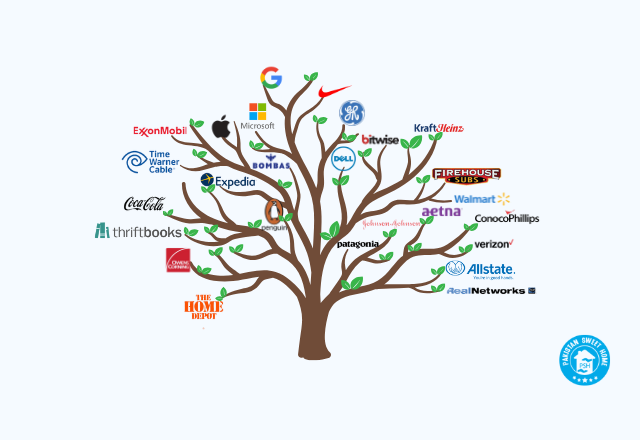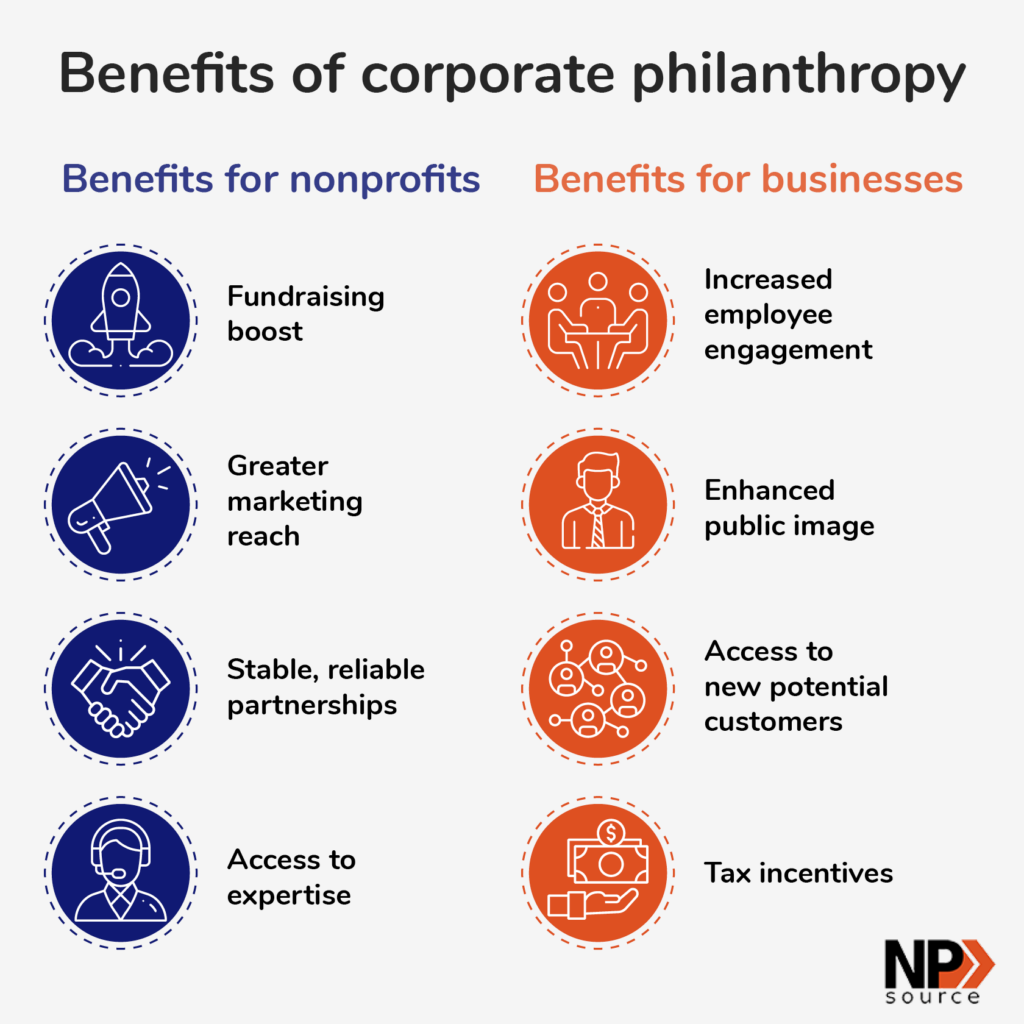How corporate philanthropy empowers neighborhood revitalization
The Role of Corporate Philanthropy in Fostering Sustainable Service Practices
Corporate philanthropy has arised as an essential strategy for companies aiming to integrate sustainability into their operations. By aligning company objectives with environmental and social initiatives, companies can promote healthier environments. This technique not just boosts corporate reputation but additionally reinforces stakeholder relationships. The true level of its influence on lasting company success remains to be checked out. What ingenious practices are being taken on because of this?
Understanding Business Philanthropy and Its Significance
Company philanthropy offers as a necessary device whereby services can contribute to social well-being while enhancing their very own track records. This practice entails companies designating resources, such as funds, time, or expertise, to sustain community campaigns, philanthropic reasons, or social programs. By participating in kind initiatives, business can resolve pressing social concerns, such as education, wellness care, and ecological concerns, consequently playing an essential role in cultivating favorable modification.
In addition, business philanthropy can improve worker spirits and bring in skill, as individuals progressively look for to function for socially responsible organizations. It can additionally strengthen consumer loyalty, as customers prefer brands that demonstrate a dedication to making a difference. Eventually, recognizing the relevance of company philanthropy depends on recognizing its double benefits: enhancing area well-being while simultaneously enhancing company credibility and credibility in the eyes of stakeholders. This positioning of social obligation with industrial interests highlights its relevance in today's business landscape.
The Connection Between Company Philanthropy and Sustainability
While many companies engage in philanthropy to enhance their public photo, a much deeper link exists between corporate philanthropy and sustainability. Corporate philanthropy commonly lines up with sustainable techniques by supporting campaigns that deal with social and environmental challenges. When organizations buy area jobs, sustainable energy, or curricula, they add to a much healthier community and society. This commitment not only cultivates a good reputation yet likewise enhances stakeholder connections, improving brand name loyalty.

Instance Studies: Successful Corporate Philanthropy Initiatives
Various firms have efficiently integrated philanthropic campaigns into their service approaches, showing the substantial benefits of such dedications. As an example, Microsoft has actually launched many programs, such as its AI for Planet effort, which supports environmental sustainability with innovation. This strategy not only aids preservation efforts however additionally improves Microsoft's online reputation as a leader in corporate obligation.
In a similar way, Unilever's Lasting Living Strategy highlights social and ecological influence, straightening its philanthropy with service goals. By funding projects that enhance health and sanitation, Unilever reinforces its brand name while adding to worldwide wellness.
An additional remarkable instance is Patagonia, which promises 1% of sales to environmental causes. This dedication reverberates with customers, cultivating commitment and driving sales.
These study highlight that efficient corporate philanthropy can yield economic returns while advertising lasting methods, reinforcing the concept that ethical service techniques are helpful for both culture and profits.
Structure Stronger Stakeholder Relationships Through Philanthropy
Philanthropy acts as an essential tool for business looking for to reinforce their partnerships with stakeholders, as it promotes trust and demonstrates a commitment to social responsibility. By involving in charitable initiatives, companies can attach with regional areas, enhancing their online reputation and motivating stakeholder commitment. This interaction often causes meaningful communications, creating a sense of shared values between the business and its stakeholders.
Moreover, kind efforts can deal with particular area requirements, enabling companies to contribute positively to social difficulties. This involvement not just showcases a firm's ethical stance but also helps in attracting and keeping consumers that prioritize social responsibility.
Additionally, workers commonly really feel extra motivated and engaged when they see their company actively taking part in philanthropic activities, bring about a much more productive work environment culture. Corporate philanthropy becomes a strategic avenue for developing stronger, a lot more resilient connections with varied stakeholder teams.
Determining the Effect of Business Philanthropy on Business Success
The connection in between corporate philanthropy and stakeholder engagement establishes the stage for evaluating its influence on general company success. Organizations commonly determine this effect through various metrics, consisting of brand name reputation, worker satisfaction, and client commitment. Philanthropic initiatives can enhance a business's image, cultivating count on among financiers and customers alike. Additionally, involved workers often tend to exhibit higher morale and productivity, directly correlating to enhanced organization efficiency.
Measurable analysis can additionally be utilized, with companies reviewing financial returns against philanthropic expenditures. Research study suggests that business with strong philanthropic commitments often experience greater stock efficiency and reduced volatility. Additionally, qualitative analyses, such as stakeholder feedback, can provide understandings right into area assumptions and long-term relational advantages.
Inevitably, measuring the impact of company philanthropy requires a complex approach, integrating both qualitative and quantitative information to guarantee a detailed understanding of its influence on business success. corporate philanthropy.
Often Asked Questions
Exactly How Can Local Business Participate In Company Philanthropy Efficiently?

What Prevail Mistaken Beliefs Concerning Company Philanthropy?

Exactly How Does Corporate Philanthropy Impact Staff Member Spirits?
Company philanthropy favorably affects staff member morale by cultivating a feeling of objective, improving task contentment, and promoting loyalty. Staff members usually feel much more engaged and inspired when their company adds to social causes, developing an encouraging job environment.
What Are the Tax Obligation Benefits of Corporate Philanthropy for Organizations?
Corporate philanthropy provides substantial tax obligation benefits for services, including deductions on charitable contributions and prospective decreases in gross income. These incentives urge business to engage in social efforts while simultaneously improving their financial standing.
Exactly How Can Firms Select Effective Philanthropic Partners?
Firms can choose efficient kind partners by examining placement with their worths, determining impact capacity, taking a look at economic transparency, and cultivating strong communication. This tactical strategy enhances collaboration and guarantees shared advantages for both events included.
Business philanthropy offers as a necessary system through which services can add to social well-being while enhancing their own credibilities - corporate philanthropy. Inevitably, understanding the significance of company philanthropy lies in recognizing its double benefits: improving neighborhood well-being you could try this out while at the same time boosting service reputation and trustworthiness in the eyes of stakeholders. While numerous firms involve in philanthropy to enhance their public picture, a much deeper link exists between business philanthropy and sustainability. The connection read what he said in between company philanthropy and stakeholder interaction establishes the stage for reviewing its impact on total organization success. Corporate philanthropy provides substantial tax obligation advantages for businesses, including reductions on philanthropic contributions and potential decreases in taxable earnings